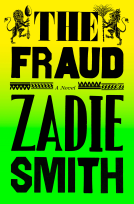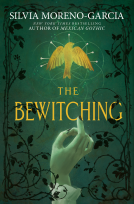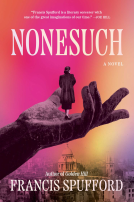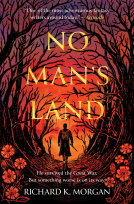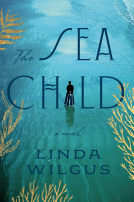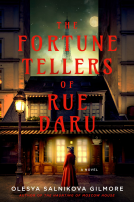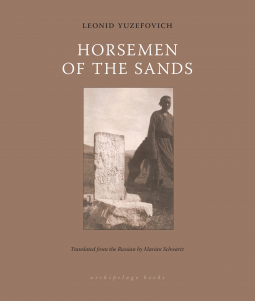
Horsemen of the Sands
by Leonid Yuzefovich
This title was previously available on NetGalley and is now archived.
Send NetGalley books directly to your Kindle or Kindle app
1
To read on a Kindle or Kindle app, please add kindle@netgalley.com as an approved email address to receive files in your Amazon account. Click here for step-by-step instructions.
2
Also find your Kindle email address within your Amazon account, and enter it here.
Pub Date Oct 30 2018 | Archive Date Jul 18 2018
Talking about this book? Use #HorsemenOfTheSands #NetGalley. More hashtag tips!
Description
Horsemen of the Sands gathers two novellas by Leonid Yuzefovich: "Horsemen of the Sands" and "The Storm." The former tells the true story of R.F. Ungern-Shternberg, also known as the "Mad Baltic Baron," a military adventurer whose intense fascination with the East drove him to seize control of Mongolia during the chaos of the Russian Civil War. "The Storm" centers on an unexpected emotional crisis that grips a Russian elementary school on an otherwise regular day, unveiling the vexed emotional bonds and shared history that knit together its community of students, teachers, parents, and staff.
Advance Praise
Praise for Leonid Yuzefovich:
"Yuzefovich is an author who knows the value of words and is firmly convinced that there is virtue in simplicity...this is high Russian prose written in superb language, very precise and lucid."--Lev Danilkin, Afisha (Russia)
"Yuzefovich is one of the undoubted and undisputed greats of present-day Russian literature."--Konstantin Milchin, TASS (Russia)
"Yuzefovich's chief merit as a writer may be his astoundingly warm, tender, and at the same time humorous attitude toward his heroes. This is seen particularly well in 'The Storm'...The heroes of "The Storm" are bathed in the warmth of the author's gaze and protected by the author's love."--Marina Abasheva, Fililog (Russia)
"Yuzefovich often takes us to Mongolia. When he writes about that country, he achieves the impossible: he knows and loves it so well and describes it so realistically that he ends up creating his own special Mongolia, a 'Mongolia of the spirit.'"--Dmitry Kosyrev, RIA Novosti (Russia)
"Accuracy and attention to real characters are a distinguishing trait of Yuzefovich's books. His historical imagination has no truck with lies...Beginning with his first success, Autocrat of the Desert, about Baron Ungern, which came out in 1993, he writes about real heroes in real circumstances."--The Village (Russia)
Available Editions
| EDITION | Other Format |
| ISBN | 9781939810090 |
| PRICE | $16.00 (USD) |
| PAGES | 234 |
Average rating from 7 members
Featured Reviews
 Kyle R, Reviewer
Kyle R, Reviewer
Mr. Yuzefovich has crafted a couple of very interesting novellas with this work. Of the two, "Horseman of the Sands" is the work that I found more interesting but "The Storm" was quite enjoyable too.
"The Storm" takes a very mundane premise, a teacher and her unruly class receiving a traffic safety brief, and makes it into a compelling story with quickly developed characters. I enjoyed the story's little twists and turns which, while fairly predictable, were still enjoyable.
The meat of the book takes place on the eastern steppes of Asia, where a Russian soldier meets a Buryat man whose life was greatly impacted by the brutal Roman von Ungern-Sternberg, the "Bloody White Baron" of Russian Civil War fame. The story jumps back and forth between the time periods but centers on a mystical artifact that supposedly made Ungern invulnerable to enemy bullets. It's an enjoyable tale, with just enough mysticism added in to balance out the harsh realities. Ungern is not whitewashed, but portrayed in a more fitting light as a charismatic, but brutal man who tried to become a reincarnated Chingiz Khan.
All in all, I felt both stories were well worth the read. I'd recommend them to anyone interested in Russian literature or Central Asia in the early 20th Century.
 Annie S, Librarian
Annie S, Librarian
Horsemen of the Sands, written by Leonid Yuzefovich and translated by Marian Schwartz, contains two novellas. In The Storm, students are treated to a terrible (in content, form, and intent) lecture from a public safety officer while events conspire to bring about what looks like divine retribution for that officer. The longer Horsemen of the Sands is a framed story about a Russian soldier in Mongolia who is treated to possibly tall tales about the notoriously violent and unstable Baron Roman Fyodorovich Ungern-Sternberg. Schwartz’s translation is skillfully done and highly readable.
The Storm begins in a rural classroom somewhere in the Soviet Union. A public safety officer is giving a lecture about road safety, possibly in response to an incident involving one of the student’s fathers. For such a short novella, there are a lot of moving parts—which I love as a fan of books in which random events start to look a lot like fate. As the officer’s lecture continues, the students get increasingly upset. The officer starts making things up to keep their attention as they squirm, to the point where one boy is moved to vomit outside the class. That boy then makes a prayer that the officer will be struck by lightning. Ordinarily, the prayer wouldn’t do anything, but in Yuzefovich’s hands, that prayer left me wondering if what happened was an accident or a sign of something else entirely.
Horseman of the Sands is a story within a story. It begins when a Russian soldier meets a Mongolian man whose father and older brother fought for Baron Ungern-Sternberg, a historical figure who led a rogue regiment into the country to…actually, I’m not sure what he was up to because the actual history is just so weird. The Mongolian man offers to give the Russian a gau (protective amulet) allegedly worn by the Baron. The Russian then listens to the Mongolian’s strange tales about the Baron’s apparent imperiousness to bullets, his volatility, and how the Mongolian’s family members were ultimately killed by him. The stories the Mongolian tells make it seem like the Baron is just following his own off-beat drum. The conclusion, however, makes us wonder if there was a cunning sort of method to the man’s madness.
Fate takes a hand in both novellas, either by accident or by apparent design. Not knowing one way or the other provides plenty of food for thought: do the bad guys deserve what happened to them? Are they actually being punished if they don’t know that what they did lead to physical pain? Is a story less powerful if there’s a mundane explanation for seemingly supernatural events? The Storm and Horsemen of the Sands are puzzling in a way that I think could inspire interesting discussion for book groups, especially groups with a philosophical bent.
 Leslie G, Book Trade Professional
Leslie G, Book Trade Professional
The marvellous novella, first in the collection of two, 'The storm' recounts the episode of a special teacher arriving in the class of a soft-hearted teacher - who is obliged to leave him on his own - he is a disciplinarian who tells cruel stories hoping to teach safety to the children. One young boy has had an accident on the road, and another's father is in prison for alcohol abuse as a driver - his harmful talk rebounds on him when one boy's curse catches him, when he takes the totem the daughter of theimprisoned man has kept to keep herself safe ... the teacher assuages all with berries she's bought reluctantly in the town (and had her wallet stolen ... again, as a lesson!) - the children and young children join together again, commenting on the passing of this earlier cold generation .... very powerful, deft characterisations ... react dialogue -
The second is a story of soldiers. . And a charmed amulet whose fate we follow from its first owner to the first-person soldier, stumbling across the 'gau' - a magical tale but more about making war, discipline - and again that same cruelty ... interesting and meaningful - it moves between present and past , different voices - but always about a kind of charmed life/superstition and war-making... rather deeply human and beautifully seriously written
Readers who liked this book also liked:
Olesya Salnikova Gilmore
General Fiction (Adult), Historical Fiction, Horror
